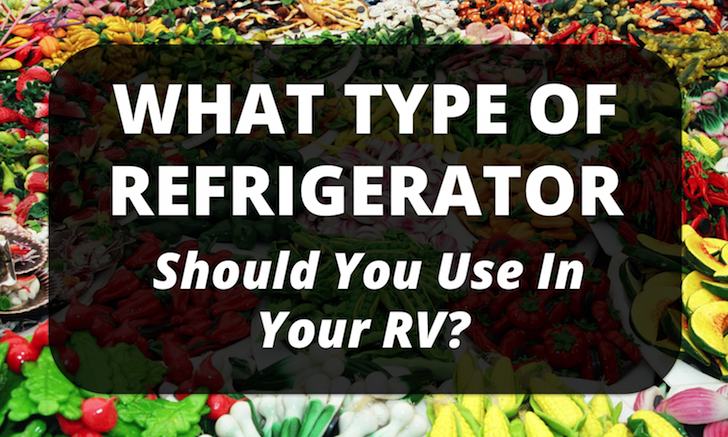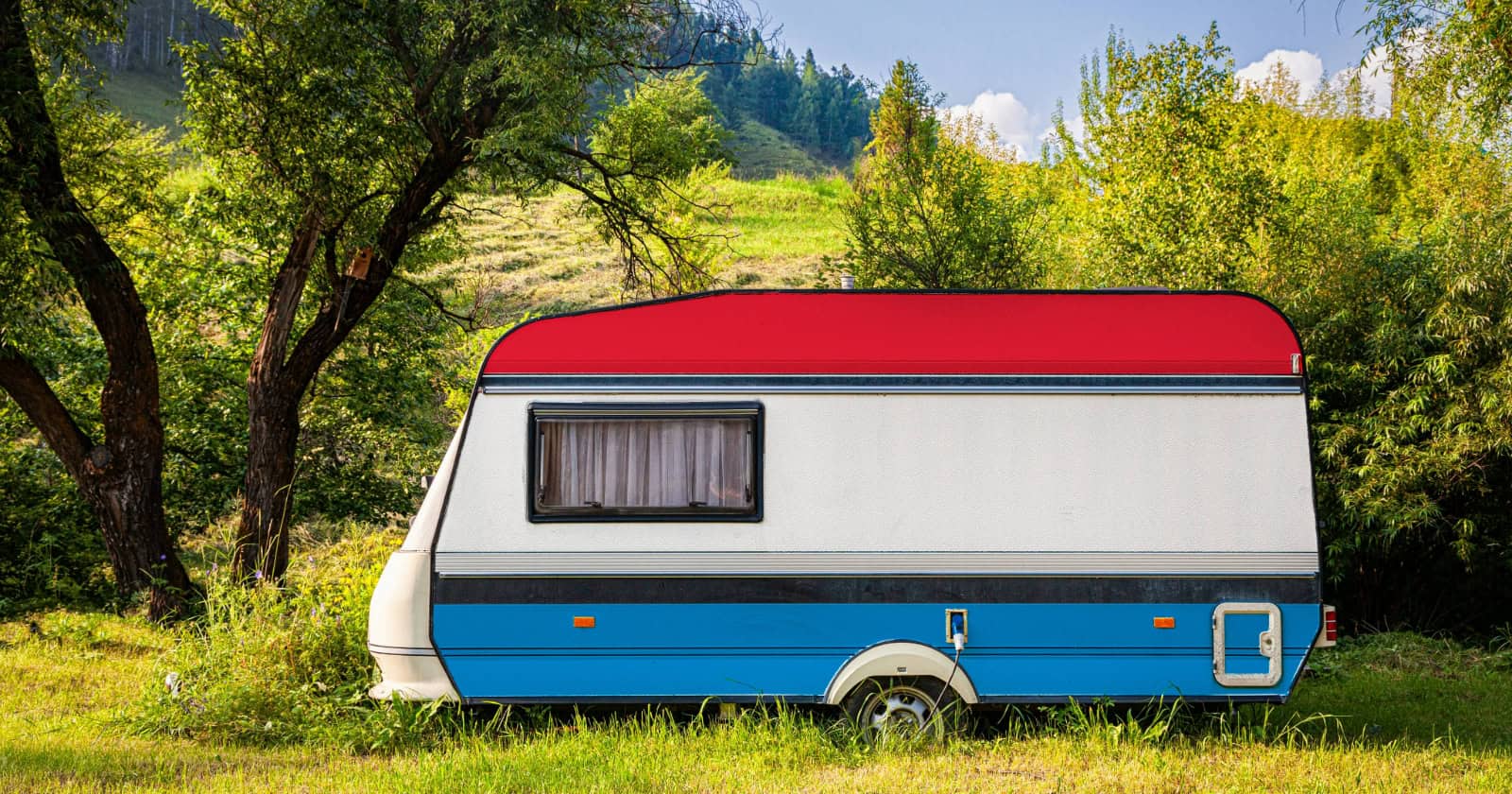In theory, we RVers are supposed to be able to take all the comforts of home on our road trips. But the reality is that in order to stay within the weight and size constraints of our rigs, we need to sacrifice some aspects of sticks-and-bricks living. This is especially true when it comes to our RV refrigerators. As any experienced RVer will tell you, this essential kitchen appliance doesn’t perform nearly as well as its domestic counterpart.
As a result, some handy DIY RVers have replaced their existing RV refrigerator with a residential model. If you’re interested in changing out your RV refrigerator for a residential unit, check out this essential information about RV refrigerator types to see if a domestic unit will work in your RV, or if you should stick to a tried-and-true RV refrigerator.
RV Refrigerator Basics
Residential and RV refrigerators operate differently. A made-for-RV type refrigerator chills food by using a process called “Absorption Refrigeration,” which requires no mechanical moving parts to make the cooling happen.
Instead of a compressor motor, absorption refrigerator units rely on a gravity-fed chemical cycle of water, ammonia, hydrogen gas and sodium chromate. The mixture makes its way through pipes in the refrigerator’s body, ultimately keeping the inside of the refrigerator cool.
You can learn how absorption refrigerators work by watching this Trailer Life video on YouTube, but this article explains the process more precisely.
RV Refrigerator Maintenance
You’ll need to perform periodic maintenance on your RV refrigerator. Residential refrigerators don’t require these considerations, and usually produce superior performance over RV-specific units. The powerful air compressor motors in residential refrigerators quickly and consistently deliver cold air without being affected by common factors that hinder the efficiency of the typical RV refrigerator. When you use an RV refrigerator you’ll have to think about:
- External ambient temperatures, which affect absorption efficiency
- Parking spot levelness, which can lead to refrigerator damage if you’re consistently parked unevenly
- Regulating internal air flow to ensure the gravity-fed system can keep things cold.
With all of the disadvantages and maintenance requirements of RV refrigerators, you may be asking yourself:
“If residential refrigerators are better, then why don’t RV makers just install those models instead of absorption refrigerators?”
It seems like an easy solution, but the reason that few RV makers offer residential refrigerators is that RV-specific models offer more flexibility when it comes to operating without shore power.
RV Refrigerators Have Multiple Power Options
Two-Way Power RV Refrigerators
RV refrigerators can be operated using two – and sometimes three – different types of power sources. Most RV reefers operate on what’s known as “Two-Way Power.” These refrigerators function on either a 110V electrical supply or propane gas.
Although plugging into a 120V power supply provides more consistent cooling power than propane, the advantages of LP gas refrigerators enables your RV to be completely self-sufficient and go anywhere you can travel. And while there’s an ever-present risk of fire if you choose to operate the RV refrigerator on propane while traveling, many RVers find it’s worth the gamble in order to keep their food as cold as possible on long driving days.
Two-way powered RV refrigerators are made by a number of manufacturers, the most popular being Norcold and Dometic. Both manufacturers offer gas absorption RV refrigerators in sizes ranging from portable coolers to apartment-sized capacities up to 17-cubic feet.
Three-Way Power RV Refrigerators
RV refrigerators can also run off of “three-way power,” which means that in addition to choosing between 120V conventional power and LP gas, RVers with three-way refrigerators can also utilize 12V power produced by the RV’s batteries to run the unit. These 12V RV refrigerators offer big advantages for campers in small vehicles like pop-ups, truck-bed campers and vans. For example:
- Their small size enables them to be installed in tight spaces.
- Your vehicle’s battery provides the power – which is safer when you’re traveling.
- They can operate safely at up to a 30-degree slope
- The absence of combustible refrigeration chemicals eliminates the risk of fire or explosion
- Most models are produced with a chest-freezer design that keeps food colder and is more energy efficient than front-facing refrigerator designs.
- With fewer parts and systems, these 12V refrigerators can last up to 25 years or more.
These reasons are the heart of why battery-powered refrigerators have been used in the marine and trucking industry for decades. Another enthusiastic audience is off-grid living aficionados, who love DC-powered refrigerators for remote locations because they can be completely powered by a cabin’s solar power system. And although these refrigerators have a long-standing reputation for being energy hogs that can quickly kill a vehicle battery, modern 12V refrigerators made by companies like Whynter, ARB, Engel, and National Luna are now more efficient than ever with newly built-in technologies and sensors that help prevent dead batteries.
Despite the advantageous qualities of 12V refrigerators, you still won’t see them in conventional, larger RVs because anything larger than a small cooler-sized model requires a battery bank that’s far bigger than most people could afford or would be willing to carry around.
More Common Questions About RV Refrigerators
Can You Use a Residential Refrigerator in Your RV?
Clearly, two and three-way powered RV refrigerators are made for the traveler. But let’s say that you don’t really go on any great adventures in your RV. Perhaps you’re a snowbird and your rig is just a way to escape bitter winter temperatures by temporarily relocating to a warmer climate. Or maybe you just prefer to live in the small size of a recreational vehicle. If you rarely dry camp for more than one or two nights and want the consistent cooling ability of a conventional household refrigerator, you might be able to install a residential refrigerator in your RV.
Residential refrigerators can cost less than half of what a RV refrigerator does, and they tend to last much longer. Before you ditch your RV fridge, here are a few factors to consider:
Can your RV’s batteries power it?
Residential refrigerators operate on “one-way power” only – 110V conventional shore power. When using a residential fridge you won’t have the option of using propane to power it. If you do need to dry camp somewhere, does your existing rig have enough battery power to run the refrigerator? As this RVing couple discovered, three house batteries in their Winnebago weren’t enough to prevent them from running their generator up to 12 hours a day. If campground rules prohibit you from running your generator that long, you’ll need to go elsewhere. Residential refrigerators that don’t have adequate battery power to run them when shore power isn’t available will severely restrict where you can stay.
How does your RV’s layout affect your choice of refrigerator?
Does your RV have a space for that residential refrigerator? Many larger RVs have room for at least an apartment-sized refrigerator inside the galley, but some carpentry modifications may be required. For example, residential refrigerators need room on the top, bottom and sides for proper ventilation. If you can’t find a refrigerator that will fit into your existing space, you’ll need to give thoughtful consideration to how you’ll make it fit. Are you capable or making those mods? Also, because residential refrigerators have a compressor motor inside, they can be noisy. If your refrigerator is right next to your sleeping area, that could be annoying.
Will it fit through the door?
Many RVers are unpleasantly surprised to find that their apartment-sized refrigerator won’t fit through their RV’s front door. Triple-check all measurements of your RV’s front door, the refrigerator itself, and any turns that you’ll need to maneuver through once the fridge is inside your rig.
What about your GVWR?
Your RV’s Gross Vehicle Weight Ratio is another major factor to consider. Can your existing RV carry the additional weight of a residential refrigerator? If your RV is a towable trailer or fifth wheel, factor in the increased weight that your tow vehicle will need to pull before you ever head to Home Depot for that apartment-sized refrigerator.
Conclusion
With all of these considerations, you can see why RVers favor gas absorption refrigerators. These units are lightweight, easy to operate under varying conditions and work well with multiple power sources.
For most of us, the inconvenience of regular maintenance and trying to find a level parking spot are a small price to pay for the ability to go off-the-beaten path and into new adventures with a tasty, cold beverage in hand.
More reading on RV refrigerators:
- How To Know If Your Rig Is Level Enough For Your RV Refrigerator To Work Properly
- Getting To Know Your RV: Important RV Refrigerator Tips Before You Hit The Road
- RV Refrigerator Stop Working? Tips For Repairing vs Replacing It
- How to maximize the efficiency of your RV refrigerator




